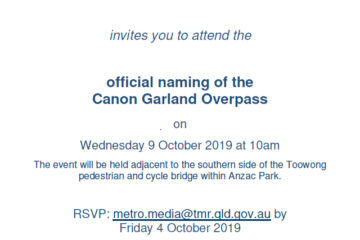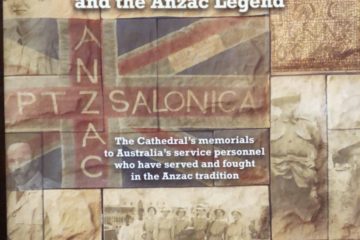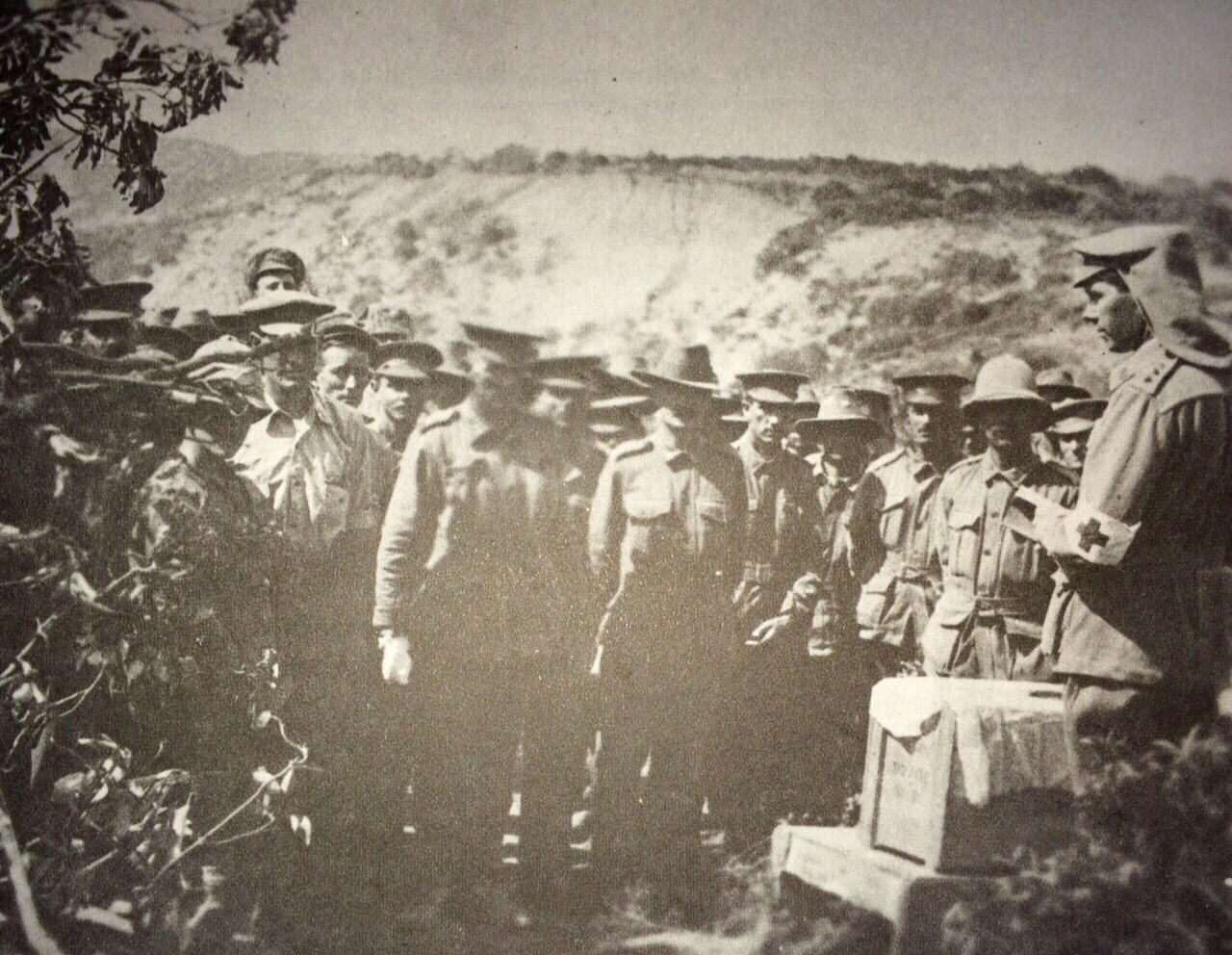The Padre looks at the Digger
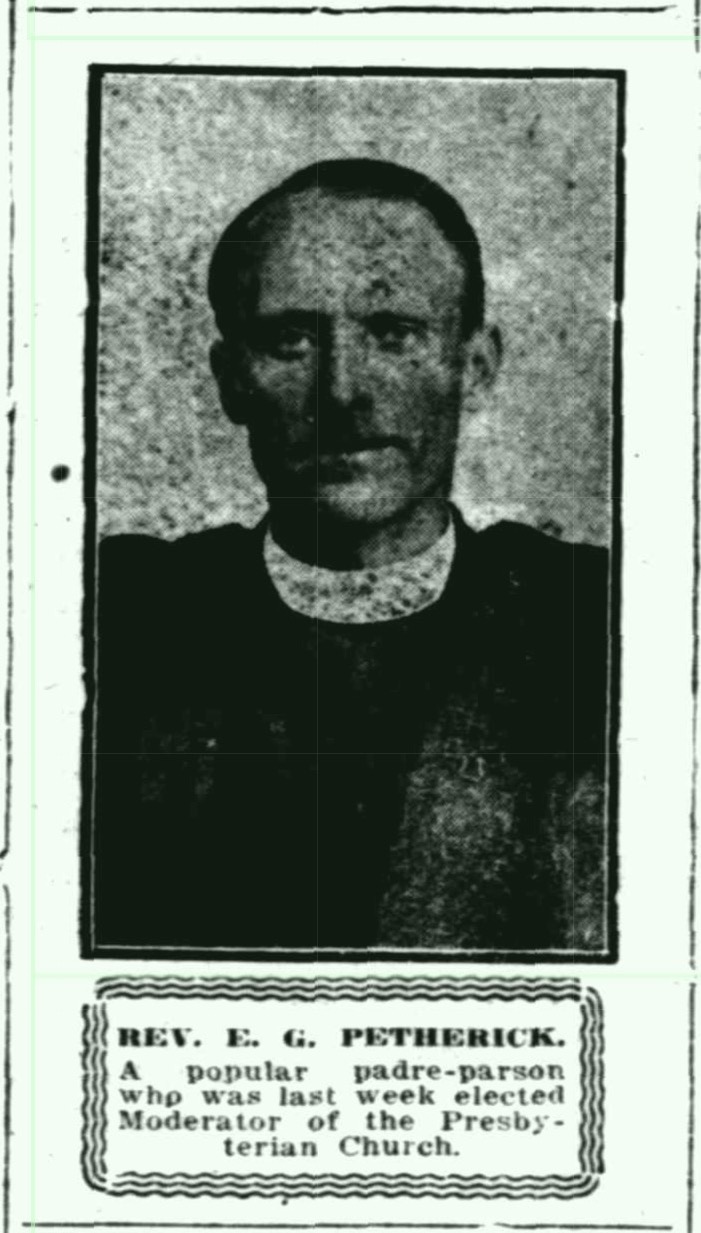
ABOVE: Former First AIF Chaplain Captain, the Reverend Ernest George Petherick was 41 when, in 1921, he was elected Moderator of the Presbyterian Church in Western Australia. This photo was published in the 15 May 1921 edition of Perth’s “The Sunday Times” (page 10).
By former First AIF Chaplain Captain, the Reverend Ernest George Petherick
ON board a transport, we asked the C.O. for permission to hold a “sing-song service” on the Sunday afternoons.
He turned down the proposal, giving the reason that the decks were so crowded that there could be no privacy, and he thought, too much of religion to risk it being insulted by unsympathetic bystanders.
I replied that I would cheerfully undertake the risk, as I was confident the boys would welcome a voluntary service.
But the colonel was obdurate, so an appeal was made to the captain of the boat, and he, a typical old sea dog, at once said, “Go ahead — the after well-deck is yours.”
At the hour appointed every inch of space was occupied, there being a good sprinkling of officers among the men.
And they had their sing-song, followed by a stirring address by a Salvation Army worker.
The skipper and the colonel looked on for a while, and later the C.O., said to me, “It was one of the remarkable scenes of my life!
Talk about the Australians having no sentiment.
Just think of how some of the hardest doers on board sang “Tell Mother I’ll Be There, in Answer to Her Prayer!”
Bible classes were held every evening, immediately after mess.
We began with eight and calculated the four-berth cabin would hold 24.
At the end of a week we had 32 present, so a dozen of them “hived off” into another cabin. Increasing numbers drove us to the C.O. again, and he cordially allowed us the use of part of the officers’ deck whilst they finished their after-dinner cigarettes in the saloon.
As we were in dangerous waters no lights could be shown, neither was singing allowed consequently we were dubious as to the attractiveness of the class to the boys.
There was no need to worry; they were counted as they stumbled up the steps, and 120 sat on the deck that first night.
Naturally the church parades on board ship were rather free and easy and this made them more enjoyable than the formal parades on land where the tedious hanging around, after perhaps a long march, made the men feel “fed up”, especially if it were a brigade parade, and 2,500 men were drawn up in a hollow square as big as a wheat paddock.
Profound was the chaplain’s relief when General Birdwood gave directions that all such formations could be broken up when the time for the address came and the men could crowd in a crescent around the flag-covered drum which served as the pulpit.
Battalion parades were more popular: the battalion was the soldiers’ “Home”, and there was that intimate relationship which counted for so much among men who, in a few short hours, might be in the furnace of battle.
But the first parade after a hard fight was always a heart-wringing time as then the depleted strength was visible.
On August 9, 1918, our battalion numbered over 800; before the next service we had 72 killed, 328 wounded 6 missing, besides 39 sick.
Such battalion, crippled in numbers, but never broken in spirit, could under-stand David’s lament for his fellow warrior: “I am distressed for thee, my brother Jonathan; very pleasant hast thou been unto me, thy love to me was wonderful, passing the love of women. How are the mighty fallen!”
And one might then follow that by speaking of the Biblical warriors who went on, “faint but pursuing”, or as modern army terminology puts it, “fed up, but stick-it”.
For the keyhole of our men’s belief was the righteousness of their cause, and faith in their ultimate victory.
“And faith,” one of them said, “is the high explosive — it moves mountains.”
In England I was attached to an Australian hospital averaging 1,400 patients, drafts coming in and going out each day.
They were men with the war psychology, whose outlook on life was backed by the horrors the Ypres salient, where the battles of September 20 and October 4 raged.
They had been crippled for months, some were getting patched up ready for another tour in the front line; others were being sent back as derelicts to Australia.
lt was the first time I had met wounded men in the mass, and I wondered how their religion, if they had any, was standing the test.
For a fortnight I moved among the wards, morning, afternoon, and sometimes at night when the lights were low, and found that at the bottom of their hearts was the desire to be understood just as they were, no matter how rough and rude their humanity might be; and that, being understood, they might helped always to play the game.
As one of such had put it —
We think about You kneeling in Garden —
Ah! God! the agony of that dread Garden —
We know You prayed for us upon the Cross.
If anything could make us glad to bear it —
‘Twould be the knowledge that You willed to bear it,
Pain — death, the uttermost of human loss.
Though we forget You — You will not forget us —
We feel sure that You will not forget us —
But stay with us until this dream is past.
And so we ask for courage, strength, and pardon —
Especially, I think, we ask for pardon —
And that You’ll stand beside us to the last.
All religious services at the hospital were voluntary.
The Anglican and Roman Catholic chaplains told me that, the attendances were not large as the doctors were busy in the wards in the morning.
They did not hold a service at night, those who were convalescent being able to go into the churches of the neighbouring town.
I decided to try the morning and evening services, but the first Sun-day gave congregations of 21 and 19, and the next was little better.
The great difficulty was that the men with you on one Sunday might be away to another hospital or camp next week.
But I kept on, and at the end of the second month, the morning congregation was over 150, and the evening ranged from 200 to 250.
My orders for France came in the Passion Week, those days which were also the Passion Week for England, as in them the great German offensive took place.
On the Sunday morning the papers were rushed, and a couple of soldiers called out “Padre, do you think God is going to let the Germans win?”
And then they discussed the probability of the Australians being in the thick of the conflict, and how it fared with their own mates. That night, their eyes, glistened when we sang —
“Thou wast their Rock, their Fortress, and their Might;
Thou, Lord, their Captain in the well fought fight;
Thou, in the darkness drear, their one true Light.
Hallelujah!
And when the strife is fierce, the warfare long,
Steals on the ear the distant triumph song,
And hearts are brave again and arms are strong.
Hallelujah!”
Holy Communion in hospital always had a special meaning.
Those men with the scarred and battered bodies knew something of Him who said “My broken body thus I give.”
Over in France it was the same. You might meet a little group about to rejoin their unit.
A verse of a hymn might be recited, a few words of cheer given, and then an invitation to go to a quiet spot so as to have Communion.
At such times we had a unity among the churches. To take one occasion, we had nine celebrating, and they represented five denominations.
When I joined up with my battalion it was in supports, and the colonel shook his head on being asked if some of the men might have a Communion service on Sunday afternoon.
When I asked again, he said, “Well, see how many want to come.”
I went round some of the trenches, and came back with 45 names. Permission was given for 25 and I tidied tip an end of an old battered barn just behind head-quarters and with four sergeants forming the choir, we had our service.
“It helps us,” said a lance-corporal who had received the D.C.M. a few weeks before.
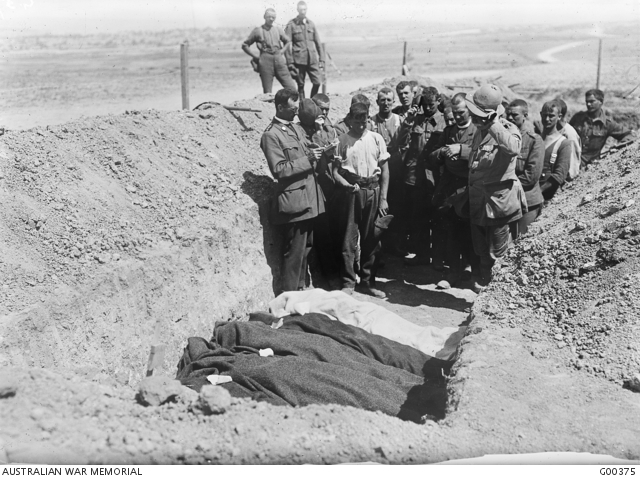
ABOVE: Three Army Chaplains (Church of England, Roman Catholic and Presbyterian), attend the burial of four fallen British heroes wrapped in blankets in an open grave. AWM Image No. G00375.
Later, we were back in a rest area, and on a summer evening two Anglican chaplains and I held a combined service, when 220 men squeezed into a schoolroom, and of these 120 remained for Communion.
I recollect that in May of that year an Anglican chaplain was giving the Sacrament to a dying soldier when he was wounded.
A Wesleyan chaplain took it from him, and gave it to the dying man. Sectarianism is a very paltry thing when viewed from a battlefield!
Another index of our men’s deeper nature was seen in the desire to have their dead comrades’ bodies laid to rest “decently and in order”.
They have been known to refuse to leave the body of a loved officer in the front line and have carried it back under heavy shelling through the witches, called trenches, so that it might be interred in a military cemetery.
Once, after some severe fighting, our battalion was in a bit of a hollow, and I was waiting to read the burial service when some of the boys asked if they could be present.
Shrapnel was searching the hollow, so when I spoke to the colonel, he told me to see that the men kept their helmets on.
I told the men to do so — and they disobeyed to a man; bareheaded they stood, looking out to the setting sun whilst I closed the service by reciting the hymn “Lead, Kindly Light”.
As we moved away, they spoke of one of the dead. “He was our sergeant and a Christian, Padre. We liked him.”
The individual testimonies of many men were striking.
A captain who had been a private on Gallipoli, and there gained the D.C.M., and was wounded later in France, said to me, “I am quite convinced that I could not have faced such dangers if it had not been for the consciousness of Divine protection.”
A well-known caricaturist and contributor to the Sydney “Truth” came frequently to my hut at the base.
One night he opened the door, and said, “I go up the line in the morning, so I’ve come to say goodbye and to ask if you would say a prayer for me.”
Poor old P——, his had been an unhappy life, and after the Armistice, I was glad to learn that he was safe and sound.
An officer told me that he had decided to follow Christ because “he wanted to be worthy of his sweetheart, and could not, if he were not a Christian”.
Once we were talking about footballers, and the name of Joe Pearce, in his year the champion league player of Melbourne, was mentioned.
He was killed on the first Anzac Day, being shot as the boats were being towed to the shore.
One of his clubmates told us, “Joe Pearce was a lovely man.”
Another footballer, who played for St. Kilda, read a verse written by one who had known the dead warrior as a Sunday school superintendent.
“The whistle blows, the Referee calls ‘Time!’
Fearless to the end you ‘played the game’.
A man clean, honest, fair and unafraid.
Who played the game as He would have it played.”
What was demanded of any professing Christian was consistency.
Among a group of men there might, at first, be little to help a man in his faith, but, if he kept true, then ultimately there would come a recognition of his worth.
“We had a little chap as a reinforcement,” a rather tough Digger said one day.
“He gave out tracts, and we gave him a pretty bad time.
“In the next stunt Fritz put over a lot of stuff and I wasn’t feeling too happy.
“The little chap was with us, and I never saw a cooler cuss.
“We told the boys when we got back and they didn’t mind him handing out tracts after that.”
Not many Bibles were seen among the men, the New Testament usually being preferred.
A soldier told me the story of “Bob” and his Bible.
“It was in the early days of the war,” he said, “and we had as a tent-mate, Bob of Collingwood. He was a kind of ‘Ginger Mick’.
“One night, after we had settled down in our tent, I happened to roll over, and thought I saw a faint light.
“I stepped over a couple of fellows, and behind a propped-up blanket was Bob, reading the Bible, with a bit of candle stuck in the sand.
“‘I didn’t know you were a Bible reader,’ I exclaimed.
“Bob looked up. ‘I promised mother to read a bit every day,’ he said.
“Our other mates by this time were sitting up, marvelling at the discovery.
“Then one said, ‘If it’s good enough for your mother to want you to read it, read it aloud for us all.’
“Bob was diffident, saying he was no reader. But they urged him, and he did so.
“It happened that the chapter he was going through was Gen. v., which gives the genealogy of some the ancients, and Bob found the name Mahalaleel a tongue-twister, especially as it occurs five times in six verses.
“‘Take it as read, Bob,’ advised one his listeners. But Bob got over the difficulty by referring to the patriarch as ‘the bloke previously mentioned’.”
Discussions on religious questions were frequent, the Almightiness of God and the presence of evil being problems in the minds of most soldiers.
A chaplain told us that a group of men asked him why God did not kill the devil, if he were the source of sin.
My friend said, “Well if God does not kill him, He at least limits him, and keeps him on the chain, as it were.”
The questioner rejoined, “It seems to me the cow might as well be free. He couldn’t do much more harm than he is doing now.”
With the fighting men there was no delusion that evil was only “good in the making”.
They wanted no truce, nor patched-up peace with the thing that made the world suffer so, and therefore asked for an Armageddon in which the devil and all his works would be annihilated.
“Resist the devil, and he will flee from you,” for they believed he has the “yellow streak”.
In one advanced dressing station we treated 1,040 wounded men in 48 hours.
Not once did I hear one of our men repine, nor regret that he had enlisted, even though his life might be ebbing fast.
I was told that one of my own sergeants was badly wounded, and I hastened to where, he was lying at the side of the courtyard.
He opened his eyes, for a second looked me full in the face, and, with a smile, said, “Well, Padre.”
The stretcher-bearers knelt beside him, and as I prayed he passed, away.
My last battle casualty was a boy who was one of 30 smashed by a chance shell. In the blackness of the barn he lay, knowing there was no hope.
“Let me hold your hands,” he said, very gently. “Mine are so cold, and yours are so warm.”
And then came the appeal, “You will write to my mother and give her my love?”
So he had loved — love stronger than death — and God is love!
And how another Armistice Day has gone. In the words of another padre I say:
“Diggers! I salute you! No, I stand bareheaded as you pass by.”
— from page 13 of “The Cairns Post” (Cairns, Queensland) of 3 December 1932.
FOOTNOTE: About the Author.
Born: 16 August 1879, Collingwood, Melbourne, Victoria.
Died: 20 May 1950, East Melbourne, Victoria.
A former minister of St. Andrew’s Presbyterian Church, who was well known and highly respected throughout the Wimmera, the Rev. Ernest George Petherick, died at St. Andrew’s Hospital, East Melbourne, on Saturday [ 20 May 1950 ] .
He was 68.
The late Mr. Petherick was a native of Victoria and had been trained at the Theological Hall, Ormond College.
As an exit student he went to Western Australia in 1906 and under him North Perth and Maylands became full charges.
In 1910 he went to the Pilbara district in North West Australia, and in the following year was called to East Fremantle.
He was invited to Boulder City in 1913, and in 1917 become a chaplain, to the, A.I.F., being attached to the 5th Battalion.
On his return to Western Australia at the conclusion of the war he had the honour of receiving a call from his former congregation at North Perth.
He was moderator of the State Assembly in 1921-22, and had just completed his term of office when he was called to Horsham, arriving here on 21 August 1922.
During his period here, St. Andrew’s continued to progress, the present Manse, being completed and opened the year following his arrival, and four new churches built.
These were Lynott Street, Horsham Dooen, McKenzie Creek and North Wonwondah.
Apart from his church activities he took an active interest in public affairs.
In sport, his chief interest was bowls; he being president of the Horsham Bowling Club in 1932, and club champion for four years, in 1924, 1925, 1930 and 1931.
It was in 1938 that he received a call to St. Leonard’s, Brighton Beach, where he was in charge until his death; which followed a brief illness.
He is survived by Mrs. Petherick and their three daughters, Lesley (Mrs. C. Emerson, Merino), Mary (Mrs. B. Waters, Sydney), and Margaret.
– from page 2 of “The Horsham Times” (Horsham, Victoria) of 23 May 1950.
